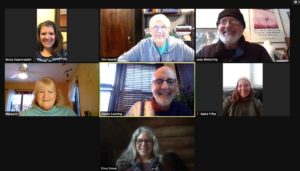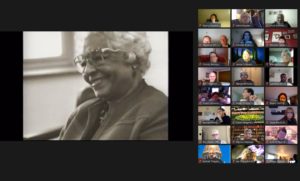



 While winter and pandemic hibernation may seem far in the past, several initiatives originally undertaken during the previous winter months have blossomed. Though diverse in focus, these initiatives shared a common thread of building networks of people in the Midwestern states dedicated to sharing Baha’u’llah’s teachings in Minnesota, Wisconsin, Illinois and Ohio.
While winter and pandemic hibernation may seem far in the past, several initiatives originally undertaken during the previous winter months have blossomed. Though diverse in focus, these initiatives shared a common thread of building networks of people in the Midwestern states dedicated to sharing Baha’u’llah’s teachings in Minnesota, Wisconsin, Illinois and Ohio.
Youth heartened by Heartland conference
Building fellowship in a time of isolation and promoting racial justice in a time of division: this was the twofold purpose of the Heartland Youth Conference, which welcomed nearly fifty teens and young adults from Illinois, Wisconsin, and Minnesota into online conversations in mid January.
Changiz Geula, a member of the Auxiliary and Regional Training Institute Boards, served on the planning task force. He said that the conference was set up to prioritize discussions among the youth, with most of the time spent in breakout sessions.
In configuring these breakout groups, Geula said the organizers set “a strict policy” of having youth facilitators run them, out of a recognition that young people “express themselves much more freely with each other than when older adults are present.” In addition, to provide multiple means of engaging the materials, the small groups did artistic activities alongside the discussions.
No doubt the centering of youth’s voices and creativity was integral to their enthusiastic response. “The youth were very galvanized and energized, so much so that some who attended the first day said they were going to invite their non-Baha’i friends to day two,” said Geula. There was unanimous demand for more gatherings like this one, and “a new task force is working on the next iteration.”
Some of the participants moved into early action, inspired by the planning they did at the conference. For example, Wisconsin youth gathered participants for a junior youth group. Several Illinois youth started weekly online gatherings, where about a dozen young people reflect on the Baha’i Writings and apply them to pressing issues. Another group of Illinoisans got involved in helping with a children’s class in one neighborhood.
And this was just the start. “Based on what the youth felt, there are many more who would be engaged if the youth invited them. They can mobilize them to . . . arise to serve,” Geula said.
Minnesotans study community-building strategies
Also in the Heartland Region, in Minnesota and western Wisconsin, teams from clusters working to advance toward the milestones set by the Universal House of Justice (the international governing council of the Baha’i Faith) came together over the winter months. Their focus: studying materials on prayer and spiritual conversations. The studies arose from a series of multi-cluster gatherings organized by the region’s Auxiliary Board members. Participating teams, mainly from clusters advancing toward the second milestone of growth, realized they needed strategies for enhancing their activities.
The teams identified devotional gatherings and conversations about Baha’i teachings as areas needing special attention. Luckily, there is a well-developed curriculum covering both these areas: the Ruhi Institute. In January, Regional Institute Coordinator Elma Strom launched two online studies in collaboration with several co-tutors.


Strom titled the first study, which was based on the prayer unit of the first Ruhi book (Reflections on the Life of the Spirit), a “Devotional Seminar.” In their weekly seminars, the cluster teams had “the opportunity to reflect on whatever action they had taken the previous week, study Book One, and plan action,” said Strom. The teams valued the chance to learn from each other’s experiences, and they worked to put that learning into action, planning new devotionals and expanding existing ones to embrace more participants from the wider community.
The second study focused on the second Ruhi book, Arising to Serve, with the aim of “learning about weaving Baha’i principles into informal conversations,” according to Strom. Though Baha’is wanted to share their beliefs with friends and neighbors, they wondered, “What do we talk about?”
At the twice-weekly meetings, participants built confidence in these conversations by practicing sharing the principles with each other. Using the chat tool, they also brainstormed ideas about how to bring up each of the themes covered in the book. Strom and her co-tutors downloaded the chat record after each meeting and distributed it to the participants; she commented that this simple act of documentation helped ensure they always had their bank of ideas at the ready.
Ohioans move along a common path
Similarly, in Ohio, cluster teams came together to learn from each other as they strove toward the shared goal of advancing through the milestones. On December 19 and 20, teams from twenty-two Ohio areas, as well as from four guest clusters in neighboring Indiana, joined the Ohio Movement of Clusters Gathering. This virtual convention was organized by Auxiliary Board members Jason Combs and Louis Maani.
“The goal was that those attending would experience a sense of common movement, have a good understanding of what a milestone was, and learn how to move from one to the next,” commented Maani. In addition to these practical goals, the gathering also had a poignant spiritual component, with an emphasis on seeking intercession.


In the Baha’i Faith, “intercession” means that through prayer, souls in the next world can support efforts in this world. So, seeking intercession entails asking departed souls for assistance. Along these lines, the convention spotlighted early Baha’is, especially Ohioan Baha’is, such as Dorothy Beecher Baker (1898–1954), who held an appointed role as a “Hand of the Cause of God,” and Elsie Austin (1908-2004), a “Knight of Baha’u’llah.” Participants also read the names of departed Ohioan Baha’is as part of a devotional program that concluded the gathering.
As the gathering drew inspiration from the past, it also looked toward the future, with a focus on planning. “The friends who came to the gathering were asked to provide information about the current reality of the training institute in their cluster, their core activities, and human resources for their cluster,” said Maani, “so they came prepared to talk about planning.” After the convention, the teams had the opportunity to implement their plans in step with the rest of Ohio, as the whole state coordinated its expansion and consolidation phases of teaching the Faith.
The cluster teams appreciated the chance to come together with other teams across the Buckeye State. “People voiced a desire to keep meeting all together,” Maani said, so the gathering gave rise to weekly all-state meetings of the Area Teaching committees where participants “share about our efforts.” Such sharing of knowledge helps everyone. For instance, when a new Area Teaching Committee was formed in one cluster, the members were able to get up to speed by joining this weekly meeting.
The “inspired and dedicated workers of the Cause with a vision of growth,” in Maani’s words, are reaping benefits from the increased communication across the state. “All of us have developed our capacities,” he added.


![]()
![]()
Whether you are exploring the Bahá'í Faith or looking to become an active member, there are various ways you can connect with our community.
Please ensure that all the Required Fields* are completed before submitting.